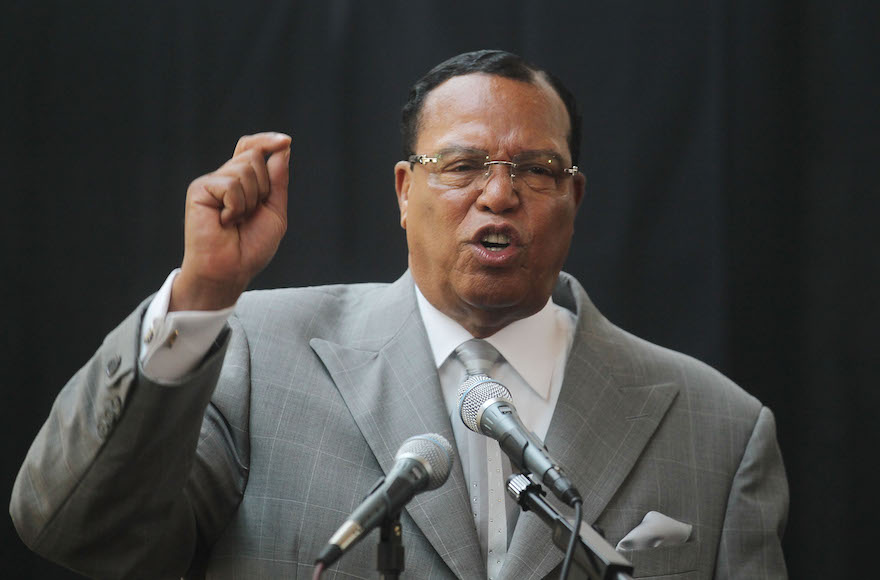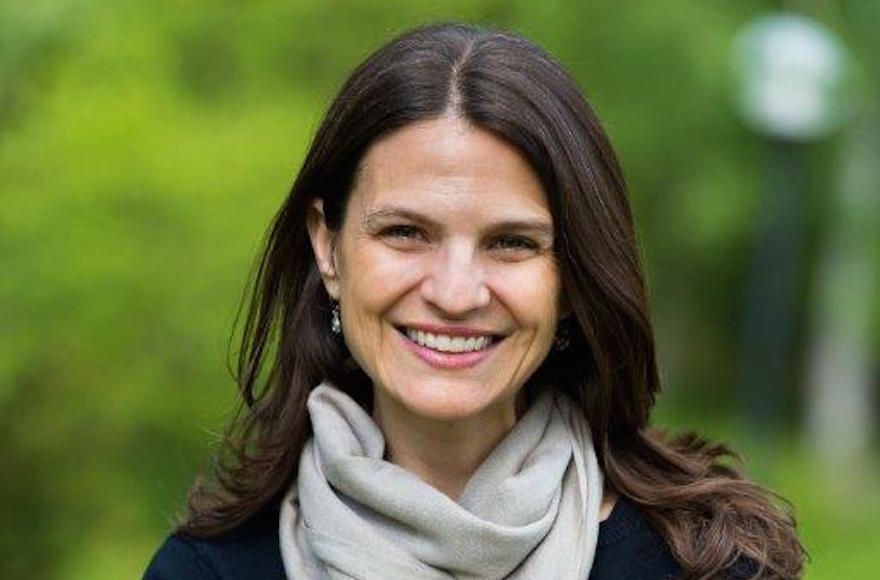NEW YORK (JTA) — Organizers of the Women’s March renounced the anti-Semitic views of Louis Farrakhan, but they stood behind one of its co-presidents who attended a speech last month by the Nation of Islam leader and seemed unperturbed by his attacks on Jews.
Tamika Mallory, co-president of the Women’s March, sparked an outcry when she posted a photo of herself and Farrakhan on Instagram following his Saviours’ Day speech in Chicago on Feb. 25.
In that speech, Farrakhan declared that “powerful Jews are my enemy” and that he had “pulled the cover off the eyes of the Satanic Jew.” Farrakhan, as he has done repeatedly in the past, also accused Jews of controlling the FBI and Hollywood, and plotting to synthesize marijuana in order to “feminize” black men.
Mallory subsequently deleted her post, but not before critics demanded to know why the leader of a broad-based civil rights movement would boast of her connections to Farrakhan.
In its statement, Women’s March leaders attempted to strike a balance between distancing themselves from Farrakhan’s anti-Semitism and supporting Mallory.
“Minister Farrakhan’s statements about Jewish, queer, and trans people are not aligned with the Women’s March Unity Principles, which were created by women of color leaders and are grounded in Kingian Nonviolence,” read the statement issued Monday, more than a week after Mallory first posted about being “super-excited” to hear Farrakhan’s message. “Women’s March is holding conversations with queer, trans, Jewish and Black members of both our team and larger movement to create space for understanding and healing.”

Louis Farrakhan speaking in New York City, June 15, 2011. (Mario Tama/Getty Images)
The statement goes on to say, “We love and value our sister and co-President Tamika Mallory, who has played a key role in shaping these conversations. Neither we nor she shy away from the fact that intersectional movement building is difficult and often painful.”
They went on to explain their delay while social media exploded in protests against Mallory’s support for Farrakhan.
“Our external silence has been because we are holding these conversations and are trying to intentionally break the cycles that pit our communities against each other,” the organizers wrote.
For her part, Mallory tweeted a statement on Sunday that addressed the criticism without mentioning Farrakhan.
“It seems I am not being clear,” she wrote. “I am and always have been against all forms of racism. I am committed to ending anti-black racism, antisemitism, homophobia & transphobia. This is why I helped create an intersectional movement to bring groups together.”
Intersectionality is the theory that various forms of oppression — for example, racism, sexism and homophobia — are all interconnected.
CNN anchor Jake Tapper was among the first to point out Mallory’s support of Farrakhan’s speech. She was then vociferously criticized by Women’s March participants and others for not condemning Farrakhan’s anti-Semitic, anti-gay and transphobic statements, which he has repeated for decades. Some critics called for her to step down as Women’s March co-chair.
Rabbi Sharon Brous, who spoke on the dais at the January 2017 Women’s March, was critical of Mallory’s support for Farrakhan.
“There is no room in a multi-faith, multi-ethnic coalitional movement for anti-semitism, homophobia or transphobia. Full stop,” Brous, rabbi of Ikar in Los Angeles, wrote on Facebook. “You can’t fight racism but excuse anti-Semitism, just as you cannot fight anti-Semitism while excusing and justifying racism or Islamophobia.”
Brous told JTA that she wished that both the Women’s March leadership and Mallory had responded more quickly and pointedly.
“I wish Tamika had walked out [of Farrakhan’s speech] when he started saying those things or immediately posted ‘I made a mistake, he is deeply flawed in his anti-Semitism and homophobia,’” the rabbi said.
Brous also said of the Women’s March statement, “I would have liked if they had said ‘there’s no place in this movement for statements attacking Jews or queers.’ I would have liked stronger language of condemnation. However I believe they’re trying to make an effort to learn from this. They’re legitimately trying to learn from this and hold together a coalition that doesn’t always naturally fit.”

Rabbi Sharon Brous has been critical of Mallory’s support for Farrakhan. (Courtesy of Brous)
The Women’s March brought 500,000 protesters to Washington, D.C., the day after President Donald Trump was inaugurated in January 2017, with millions more gathering at sister marches around the world.
Linda Sarsour, a Palestinian American and frequent critic of Israel, is another of the Women’s March organizers and co-chairs. She also defended Mallory in a tweet.
“Don’t hold people to standards you refuse to hold yourself to,” she wrote.
Women’s March organizers did not respond to requests for an interview. Neither did its communications director, Sophie Ellman-Golan, who is the daughter of a rabbi. She did tweet on Monday, “to my queer, trans and Jewish siblings: I love you. I see you. I am so sorry. We deserve more than this.”
Many said Mallory’s support for Farrakhan was of a piece with other progressive movements that have downplayed or tolerated anti-Semitism or harsh anti-Israel rhetoric among their allies.
“Despite all the talk about intersectionality, many of these people think it’s perfectly acceptable to leave out Judaism, often for reasons that have nothing to do with faith itself or the reasons why Jews have been brutalized for centuries,” wrote Lily Herman, a Jewish columnist for the young women’s website Refinery29.
Brous told JTA, “It is absolutely true that the left has an anti-Semitism problem and has to reckon with that. I feel that this moment is an opportunity, this intersectional coalitional moment and feminist moment is an opportunity to put forward a different type of leadership. We don’t have to hold our breath when elder statespeople [like Farrakhan] say noxious things. Instead we need to really cleanse that language of hate out of the leadership.”
Brous said she will not step away from her relationship with Sarsour and other Women’s March organizers.
“It’s essential that we stay in dialogue,” she said. “When you’re getting screamed at and insulted on social media, it doesn’t open the heart to want to engage more deeply in the Jewish people’s suffering. It’s only the people willing to still be in conversation and say ‘it hurt me’ that this changes. There’s a steep learning curve here.”
Rebecca Einstein Schorr, a Reform rabbi and writer in Pennsylvania, is a Women’s March supporter who says she feels increasingly alienated by anti-Semitism.
She loved participating in the January 2017 Women’s March and was proud to hold a sign identifying herself as a rabbi. But now, she wrote under the Brous Facebook post, “How do we support a movement that continues to be led by those who support an anti-Semite? I feel really marginalized and that there is no place for me at the Women’s March.”
After the march organizers issued their statement, Einstein Schorr told JTA, “I’m really happy they at least addressed it. It’s a great first step. It is necessary for them to acknowledge the pain we’re feeling by a member of their leadership being aligned with such a complicated personality.”
But, said Einstein Schorr, she is hoping for more because even she is beginning to feel sidelined within the progressive feminist community represented by the Women’s March.
“Whenever the Jewish community tries to be a part of these movements, we end up getting shunted aside,” she said.
Einstein Schorr said she hopes that Mallory will sit down with leaders of the Jewish community.
“It’s important for us to hear why is it that Farrakhan and others like him continue to be so appealing, and for her to understand why we feel so vulnerable,” she said. “And why we feel we have no place at the table.”
JTA has documented Jewish history in real-time for over a century. Keep our journalism strong by joining us in supporting independent, award-winning reporting.






